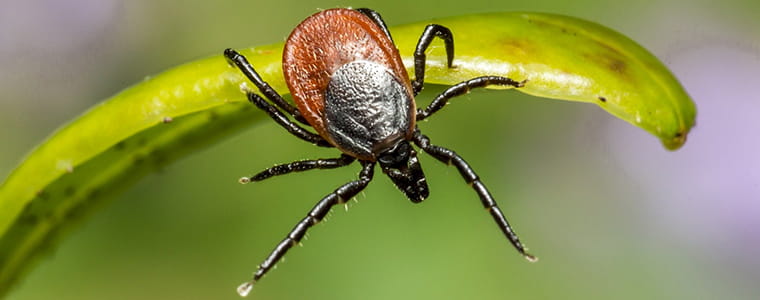Global warming widening reach of tickborne diseases across Europe

Climate change is causing the geographical expansion of disease-carrying ticks and tiger mosquitoes, leading to outbreaks of rarely seen diseases in some European countries including the UK, according to a report written by the University of the West of England (UWE Bristol). The report, which looks at the global spread of zoonotic diseases and the link to climate change, was recently published by the Department of the Environment in the EU.
Written by the Science for Environment Policy team at the University’s Science Communication unit (SCU), the research highlighted how over the last two decades, tick-transmitted diseases such as Lyme disease, tickborne relapsing fever, tick-borne encephalitis and Crimean Congo haemorrhagic fever viruses have continued to increase in frequency and range across Europe.
This is in part due to climate change creating longer mild seasons when the ticks are active and the broadening of their geographic range northwards into previously colder regions, and up to higher altitudes.
For example, Borrelia miyamotoi, the organism that can cause some tickborne diseases, has now been observed in numerous European countries including the UK, Czech Republic, Denmark, Estonia, France, Germany, Netherlands, Norway, Poland, Romania, Sweden and Switzerland. A bite from the infected tick can lead to diseases including tick-borne relapsing fever.
Nicola Shale, who is a science writer in the SCU and is co-author of the report, said: “Borrelia miyamotoi can occur with Lyme disease and other tick-borne infections – such as the blood parasite babesia – resulting in unusual symptoms, meaning it is under-reported.
“Clinicians in the UK and other European countries might not have heard of Borrelia miyamotoi, or the blood parasite Babesia, yet these human pathogens are present in some ticks in the UK. Healthcare systems, therefore, need to be primed for patients presenting with new zoonotic diseases, as climate change causes novel pathogens to become more prevalent in northern European countries.”
Global warming is also contributing to the increasing occurrence of tiger mosquitos across Europe, leading to malaria re-emerging in Greece, West Nile virus emerging across parts of Eastern Europe, as well as dengue fever in Croatia and chikungunya in France. Shale said: “The spread of the invasive tiger mosquito across Europe is particularly concerning, as they are more competent vectors for more dangerous pathogens than the native European species of mosquito.”
The report found that the increasing frequency of epidemics and pandemics (including Covid-19) since 2000 has been linked to the same global environmental changes driving biodiversity loss and climate change. The majority of emerging diseases (e.g. Ebola, Zika) and almost all known pandemics are caused by microbes of animal origin (and are therefore called ‘zoonoses’). And it warned that the more we have contact with wildlife and livestock, the more likely these microbes may ‘spill over’ to humans.
However, land use change, agricultural intensification and expansion, wildlife trade and consumption are all increasing wildlife/human contact. The global demand for meat in poorer nations by developed nations, for instance, is leading to unsustainable farming practices and land clearance – ultimately contributing to increased pandemic risk.
Shale said: “The research highlights the interconnectedness of human and environmental health and raises awareness around health threats posed by practices such as buying exotic pets. For example, Monkey Pox first emerged in the West, in the US in 2003, and was traced back to a shipment of Gambian pouched rats sold as pets. It also helps provide more in-depth knowledge of the environmental drivers of disease, to nudge people towards better environmental stewardship.”
The report also referred to the One Health High-Level Expert Panel, convened in 2021 by the World Health Organization (WHO) to provide policy-relevant science on health with regard to human/animal interaction. In particular, the panel is looking to create guidance on a long-term strategic approach to reducing the risk of zoonotic pandemics, with an associated monitoring and early-warning framework.
Related news

10 February 2026
Work by UWE Bristol lecturer features in Government’s National Cancer Plan
Work by a UWE Bristol academic has been included in the Government’s National Cancer Plan.

23 January 2026
On-demand minibus services beneficial in rural areas but face financial challenges, trials suggest
Trials of ‘demand responsive transport’ minibus services boosted connectivity for people in rural and suburban areas, according to a new report produced by UWE Bristol researchers.

18 December 2025
UWE Bristol professor appointed National Institute for Health and Care Excellence CEO
Jonathan Benger CBE, Professor of Emergency Care at UWE Bristol, has been appointed as the new chief executive officer of the National Institute for Health and Care Excellence (NICE).

17 December 2025
Findings revealed from first UK study into experiences of mothers who are survivors of rape pregnancy
UWE Bristol academics have revealed the findings of the first UK-based study of the experiences of mothers who are survivors of rape pregnancy.

11 December 2025
Social media influencer work is far more demanding than it looks, research finds
A study exploring the mental health impacts of social media influencer work has revealed that life online is far more demanding than it appears.

25 November 2025
UWE Bristol experts join film Q&A exploring music and melodrama
Academics will take part in the Cary Comes Home Festival, with a post-screening Q&A exploring music, melodrama and emotional storytelling in classic cinema.

17 November 2025
Urgent reform needed to support ambulance-delivered end of life care, study finds
More than three quarters (78 per cent) of paramedics sometimes fear doing the wrong thing when caring for people in the last year of life, new research has found.

13 November 2025
Bristol’s screen industry experiences “boom-and-bust cycle” after post-pandemic recovery, new research from UWE Bristol finds
New research from UWE Bristol provides detailed insight into Bristol's screen sector.

13 November 2025
New AI research to revolutionise animal welfare
A UWE Bristol research project will combine behavioural science and AI to create technology that understands not only what animals do, but how they feel.

10 November 2025
Lessons from Low Traffic Neighbourhoods will drive better public engagement, study finds
Lessons from Low Traffic Neighbourhoods have informed a new toolkit to improve engagement with the public on challenging local street issues.

06 November 2025
First-of-its-kind study aims to help more people spend their final days at home
A new study will explore how architectural design could support end-of-life care in domestic settings.

29 October 2025
UWE Bristol academic unveils breakthrough in energy-efficient AI at NATO science forum
Dr Jonathan Lancelot has developed a new form of AI that could transform how intelligent machines operate in space, defence, and remote environments.






